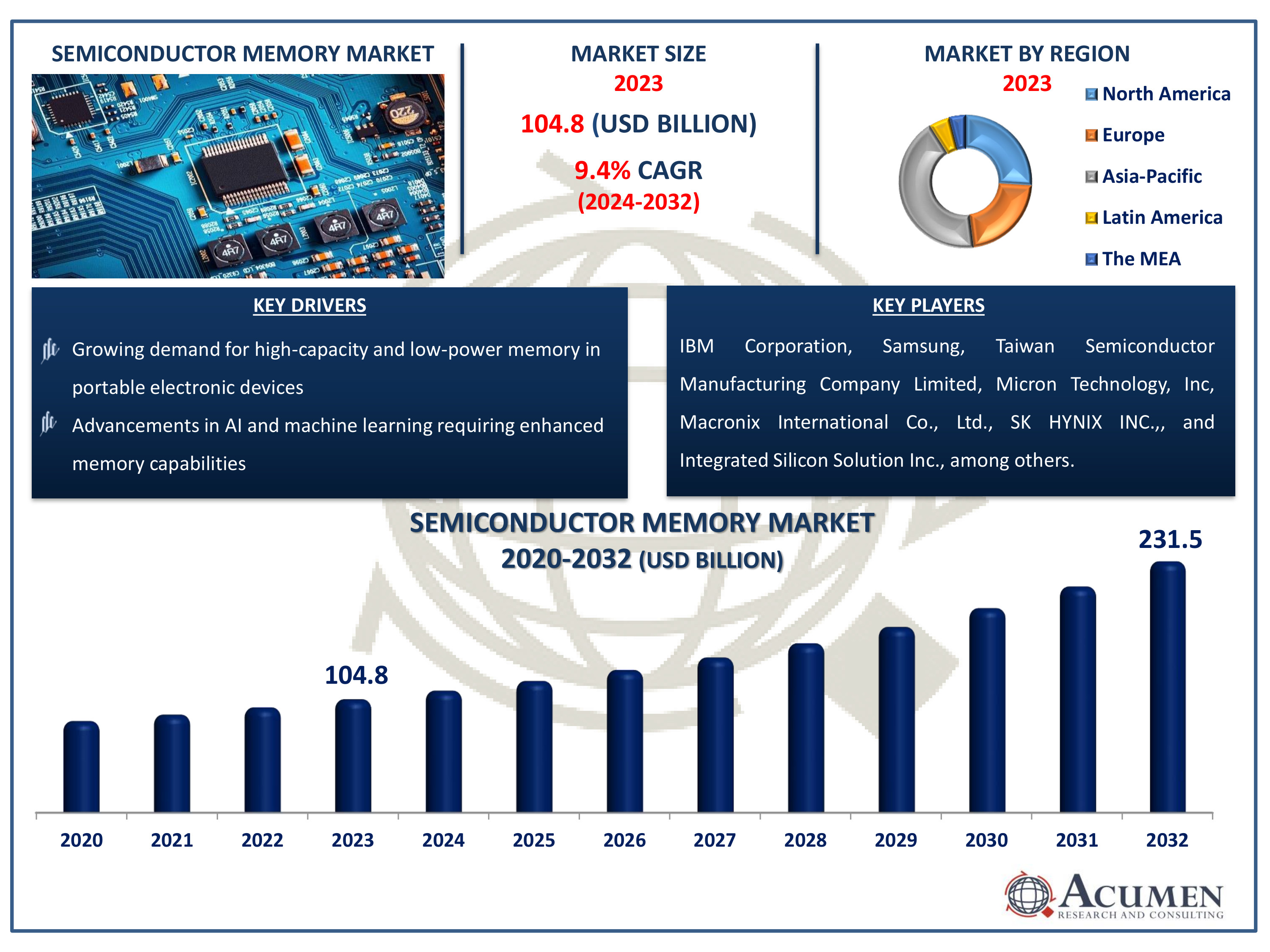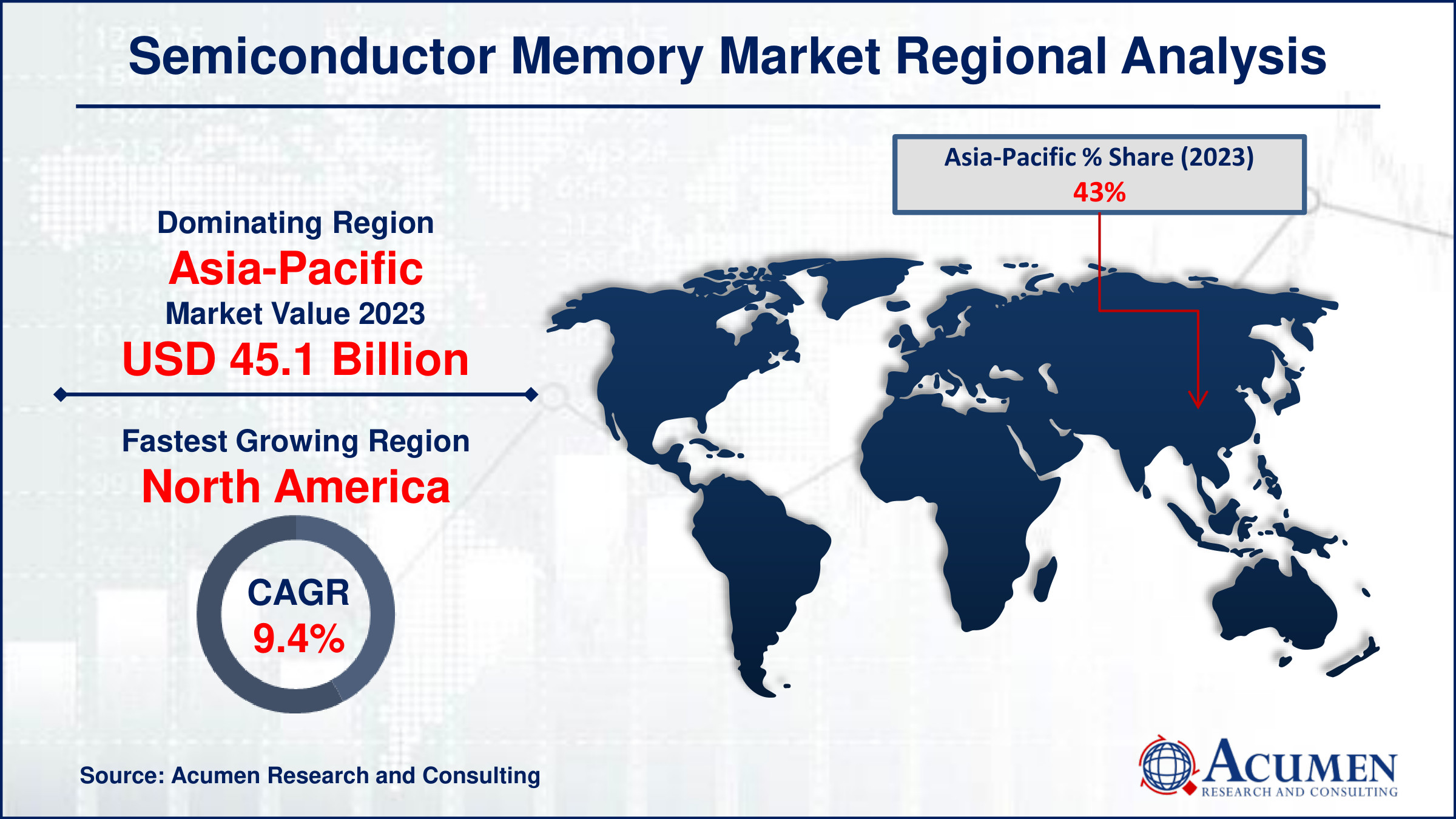
Semiconductor Memory Market Size - Global Industry, Share, Analysis, Trends and Forecast 2024 - 2032
CHAPTER 1. Industry Overview of Semiconductor Memory Market
1.1. Definition and Scope
1.1.1. Definition of Semiconductor Memory
1.1.2. Market Segmentation
1.1.3. Years Considered for the Study
1.1.4. Assumptions and Acronyms Used
1.1.4.1. Market Assumptions and Market Forecast
1.1.4.2. Acronyms Used in Global Semiconductor Memory Market
1.2. Summary
1.2.1. Executive Summary
1.2.2. Semiconductor Memory Market By Type
1.2.3. Semiconductor Memory Market By Application
1.2.4. Semiconductor Memory Market By Region
CHAPTER 2. Research Approach
2.1. Methodology
2.1.1. Research Programs
2.1.2. Market Size Estimation
2.1.3. Market Breakdown and Data Triangulation
2.2. Data Source
2.2.1. Secondary Sources
2.2.2. Primary Sources
CHAPTER 3. Market Dynamics And Competition Analysis
3.1. Market Drivers
3.1.1. Driver 1
3.1.2. Driver 2
3.2. Restraints and Challenges
3.2.1. Restraint 1
3.2.2. Restraint 2
3.3. Growth Opportunities
3.3.1. Opportunity 1
3.3.2. Opportunity 2
3.4. Porter’s Five Forces Analysis
3.4.1. Bargaining Power of Suppliers
3.4.2. Bargaining Power of Buyers
3.4.3. Threat of Substitute
3.4.4. Threat of New Entrants
3.4.5. Degree of Competition
3.5. Market Concentration Ratio and Market Maturity Analysis of Semiconductor Memory Market
3.5.1. Go To Market Strategy
3.5.1.1. Introduction
3.5.1.2. Growth
3.5.1.3. Maturity
3.5.1.4. Saturation
3.5.1.5. Possible Development
3.6. Technological Roadmap for Semiconductor Memory Market
3.7. Value Chain Analysis
3.7.1. List of Key Manufacturers
3.7.2. List of Customers
3.7.3. Level of Integration
3.8. Cost Structure Analysis
3.8.1. Price Trend of Key Raw Materials
3.8.2. Raw Material Suppliers
3.8.3. Proportion of Manufacturing Cost Structure
3.8.3.1. Raw Material
3.8.3.2. Labor Cost
3.8.3.3. Manufacturing Expense
3.9. Regulatory Compliance
3.10. Competitive Landscape, 2023
3.10.1. Player Positioning Analysis
3.10.2. Key Strategies Adopted By Leading Players
CHAPTER 4. Manufacturing Plant Analysis
4.1. Manufacturing Plant Location and Establish Date of Major Manufacturers in 2023
4.2. R&D Status of Major Manufacturers in 2023
CHAPTER 5. Semiconductor Memory Market By Type
5.1. Introduction
5.2. Semiconductor Memory Revenue By Type
5.2.1. Semiconductor Memory Revenue (USD Million) and Forecast, By Type, 2020-2032
5.2.2. SRAM
5.2.2.1. SRAM Market Revenue (USD Million) and Growth Rate (%), 2020-2032
5.2.3. MRAM
5.2.3.1. MRAM Market Revenue (USD Million) and Growth Rate (%), 2020-2032
5.2.4. DRAM
5.2.4.1. DRAM Market Revenue (USD Million) and Growth Rate (%), 2020-2032
5.2.5. Flash ROM
5.2.5.1. Flash ROM Market Revenue (USD Million) and Growth Rate (%), 2020-2032
5.2.6. Others
5.2.6.1. Others Market Revenue (USD Million) and Growth Rate (%), 2020-2032
CHAPTER 6. Semiconductor Memory Market By Application
6.1. Introduction
6.2. Semiconductor Memory Revenue By Application
6.2.1. Semiconductor Memory Revenue (USD Million) and Forecast, By Application, 2020-2032
6.2.2. Consumer Electronics
6.2.2.1. Consumer Electronics Market Revenue (USD Million) and Growth Rate (%), 2020-2032
6.2.3. Automotive
6.2.3.1. Automotive Market Revenue (USD Million) and Growth Rate (%), 2020-2032
6.2.4. Industrial
6.2.4.1. Industrial Market Revenue (USD Million) and Growth Rate (%), 2020-2032
6.2.5. Medical
6.2.5.1. Medical Market Revenue (USD Million) and Growth Rate (%), 2020-2032
6.2.6. Aerospace And Defense
6.2.6.1. Aerospace And Defense Market Revenue (USD Million) and Growth Rate (%), 2020-2032
6.2.7. IT & Telecommunication
6.2.7.1. IT & Telecommunication Market Revenue (USD Million) and Growth Rate (%), 2020-2032
6.2.8. Others
6.2.8.1. Others Market Revenue (USD Million) and Growth Rate (%), 2020-2032
CHAPTER 7. North America Semiconductor Memory Market By Country
7.1. North America Semiconductor Memory Market Overview
7.2. U.S.
7.2.1. U.S. Semiconductor Memory Revenue (USD Million) and Forecast By Type, 2020-2032
7.2.2. U.S. Semiconductor Memory Revenue (USD Million) and Forecast By Application, 2020-2032
7.3. Canada
7.3.1. Canada Semiconductor Memory Revenue (USD Million) and Forecast By Type, 2020-2032
7.3.2. Canada Semiconductor Memory Revenue (USD Million) and Forecast By Application, 2020-2032
7.4. North America PEST Analysis
CHAPTER 8. Europe Semiconductor Memory Market By Country
8.1. Europe Semiconductor Memory Market Overview
8.2. U.K.
8.2.1. U.K. Semiconductor Memory Revenue (USD Million) and Forecast By Type, 2020-2032
8.2.2. U.K. Semiconductor Memory Revenue (USD Million) and Forecast By Application, 2020-2032
8.3. Germany
8.3.1. Germany Semiconductor Memory Revenue (USD Million) and Forecast By Type, 2020-2032
8.3.2. Germany Semiconductor Memory Revenue (USD Million) and Forecast By Application, 2020-2032
8.4. France
8.4.1. France Semiconductor Memory Revenue (USD Million) and Forecast By Type, 2020-2032
8.4.2. France Semiconductor Memory Revenue (USD Million) and Forecast By Application, 2020-2032
8.5. Spain
8.5.1. Spain Semiconductor Memory Revenue (USD Million) and Forecast By Type, 2020-2032
8.5.2. Spain Semiconductor Memory Revenue (USD Million) and Forecast By Application, 2020-2032
8.6. Rest of Europe
8.6.1. Rest of Europe Semiconductor Memory Revenue (USD Million) and Forecast By Type, 2020-2032
8.6.2. Rest of Europe Semiconductor Memory Revenue (USD Million) and Forecast By Application, 2020-2032
8.7. Europe PEST Analysis
CHAPTER 9. Asia Pacific Semiconductor Memory Market By Country
9.1. Asia Pacific Semiconductor Memory Market Overview
9.2. China
9.2.1. China Semiconductor Memory Revenue (USD Million) and Forecast By Type, 2020-2032
9.2.2. China Semiconductor Memory Revenue (USD Million) and Forecast By Application, 2020-2032
9.3. Japan
9.3.1. Japan Semiconductor Memory Revenue (USD Million) and Forecast By Type, 2020-2032
9.3.2. Japan Semiconductor Memory Revenue (USD Million) and Forecast By Application, 2020-2032
9.4. India
9.4.1. India Semiconductor Memory Revenue (USD Million) and Forecast By Type, 2020-2032
9.4.2. India Semiconductor Memory Revenue (USD Million) and Forecast By Application, 2020-2032
9.5. Australia
9.5.1. Australia Semiconductor Memory Revenue (USD Million) and Forecast By Type, 2020-2032
9.5.2. Australia Semiconductor Memory Revenue (USD Million) and Forecast By Application, 2020-2032
9.6. South Korea
9.6.1. South Korea Semiconductor Memory Revenue (USD Million) and Forecast By Type, 2020-2032
9.6.2. South Korea Semiconductor Memory Revenue (USD Million) and Forecast By Application, 2020-2032
9.7. Rest of Asia-Pacific
9.7.1. Rest of Asia-Pacific Semiconductor Memory Revenue (USD Million) and Forecast By Type, 2020-2032
9.7.2. Rest of Asia-Pacific Semiconductor Memory Revenue (USD Million) and Forecast By Application, 2020-2032
9.8. Asia Pacific PEST Analysis
CHAPTER 10. Latin America Semiconductor Memory Market By Country
10.1. Latin America Semiconductor Memory Market Overview
10.2. Brazil
10.2.1. Brazil Semiconductor Memory Revenue (USD Million) and Forecast By Type, 2020-2032
10.2.2. Brazil Semiconductor Memory Revenue (USD Million) and Forecast By Application, 2020-2032
10.3. Mexico
10.3.1. Mexico Semiconductor Memory Revenue (USD Million) and Forecast By Type, 2020-2032
10.3.2. Mexico Semiconductor Memory Revenue (USD Million) and Forecast By Application, 2020-2032
10.4. Rest of Latin America
10.4.1. Rest of Latin America Semiconductor Memory Revenue (USD Million) and Forecast By Type, 2020-2032
10.4.2. Rest of Latin America Semiconductor Memory Revenue (USD Million) and Forecast By Application, 2020-2032
10.5. Latin America PEST Analysis
CHAPTER 11. Middle East & Africa Semiconductor Memory Market By Country
11.1. Middle East & Africa Semiconductor Memory Market Overview
11.2. GCC
11.2.1. GCC Semiconductor Memory Revenue (USD Million) and Forecast By Type, 2020-2032
11.2.2. GCC Semiconductor Memory Revenue (USD Million) and Forecast By Application, 2020-2032
11.3. South Africa
11.3.1. South Africa Semiconductor Memory Revenue (USD Million) and Forecast By Type, 2020-2032
11.3.2. South Africa Semiconductor Memory Revenue (USD Million) and Forecast By Application, 2020-2032
11.4. Rest of Middle East & Africa
11.4.1. Rest of Middle East & Africa Semiconductor Memory Revenue (USD Million) and Forecast By Type, 2020-2032
11.4.2. Rest of Middle East & Africa Semiconductor Memory Revenue (USD Million) and Forecast By Application, 2020-2032
11.5. Middle East & Africa PEST Analysis
CHAPTER 12. Player Analysis Of Semiconductor Memory Market
12.1. Semiconductor Memory Market Company Share Analysis
12.2. Competition Matrix
12.2.1. Competitive Benchmarking of key players by price, presence, market share, and R&D investment
12.2.2. New Product Launches and Product Enhancements
12.2.3. Mergers And Acquisition In Global Semiconductor Memory Market
12.2.4. Partnership, Joint Ventures and Strategic Alliances/ Sales Agreements
CHAPTER 13. Company Profile
13.1. IBM Corporation
13.1.1. Company Snapshot
13.1.2. Business Overview
13.1.3. Financial Overview
13.1.3.1. Revenue (USD Million), 2023
13.1.3.2. IBM Corporation 2023 Semiconductor Memory Business Regional Distribution
13.1.4. Product /Service and Specification
13.1.5. Recent Developments & Business Strategy
13.2. Samsung
13.3. Taiwan Semiconductor Manufacturing Company Limited
13.4. Micron Technology, Inc
13.5. Macronix International Co., Ltd.
13.6. SK HYNIX INC.
13.7. TOSHIBA ELECTRONIC DEVICES & STORAGE CORPORATION
13.8. Integrated Silicon Solution Inc.
13.9. Infineon Technologies AG
13.10. Texas Instruments Incorporated
Frequently Asked Questions
How big is the semiconductor memory market?
The semiconductor memory market size was valued at USD 104.8 billion in 2023.
What is the CAGR of the global semiconductor memory market from 2024 to 2032?
The CAGR of semiconductor memory is 9.4% during the analysis period of 2024 to 2032.
Which are the key players in the semiconductor memory market?
The key players operating in the global market are including IBM Corporation, Samsung, Taiwan Semiconductor Manufacturing Company Limited, Micron Technology, Inc, Macronix International Co., Ltd., SK HYNIX INC., TOSHIBA ELECTRONIC DEVICES & STORAGE CORPORATION, Integrated Silicon Solution Inc., Infineon Technologies AG, and Texas Instruments Incorporated.
Which region dominated the global semiconductor memory market share?
Asia-Pacific held the dominating position in semiconductor memory industry during the analysis period of 2024 to 2032.
Which region registered fastest CAGR from 2024 to 2032?
North America region exhibited fastest growing CAGR for market of semiconductor memory during the analysis period of 2024 to 2032.
What are the current trends and dynamics in the global semiconductor memory industry?
The current trends and dynamics in the semiconductor memory industry include growing demand for high-capacity and low-power memory in portable electronic devices, increasing adoption of IoT devices and smart home technologies, advancements in AI and machine learning requiring enhanced memory capabilities, and expansion of data centers and cloud computing services.
Which application held the maximum share in 2023?
The consumer electronics application held the maximum share of the semiconductor memory industry.
Select Licence Type
Connect with our sales team
Why Acumen Research And Consulting
100%
Customer Satisfaction
24x7
Availability - we are always there when you need us
200+
Fortune 50 Companies trust Acumen Research and Consulting
80%
of our reports are exclusive and first in the industry
100%
more data and analysis
1000+
reports published till date







